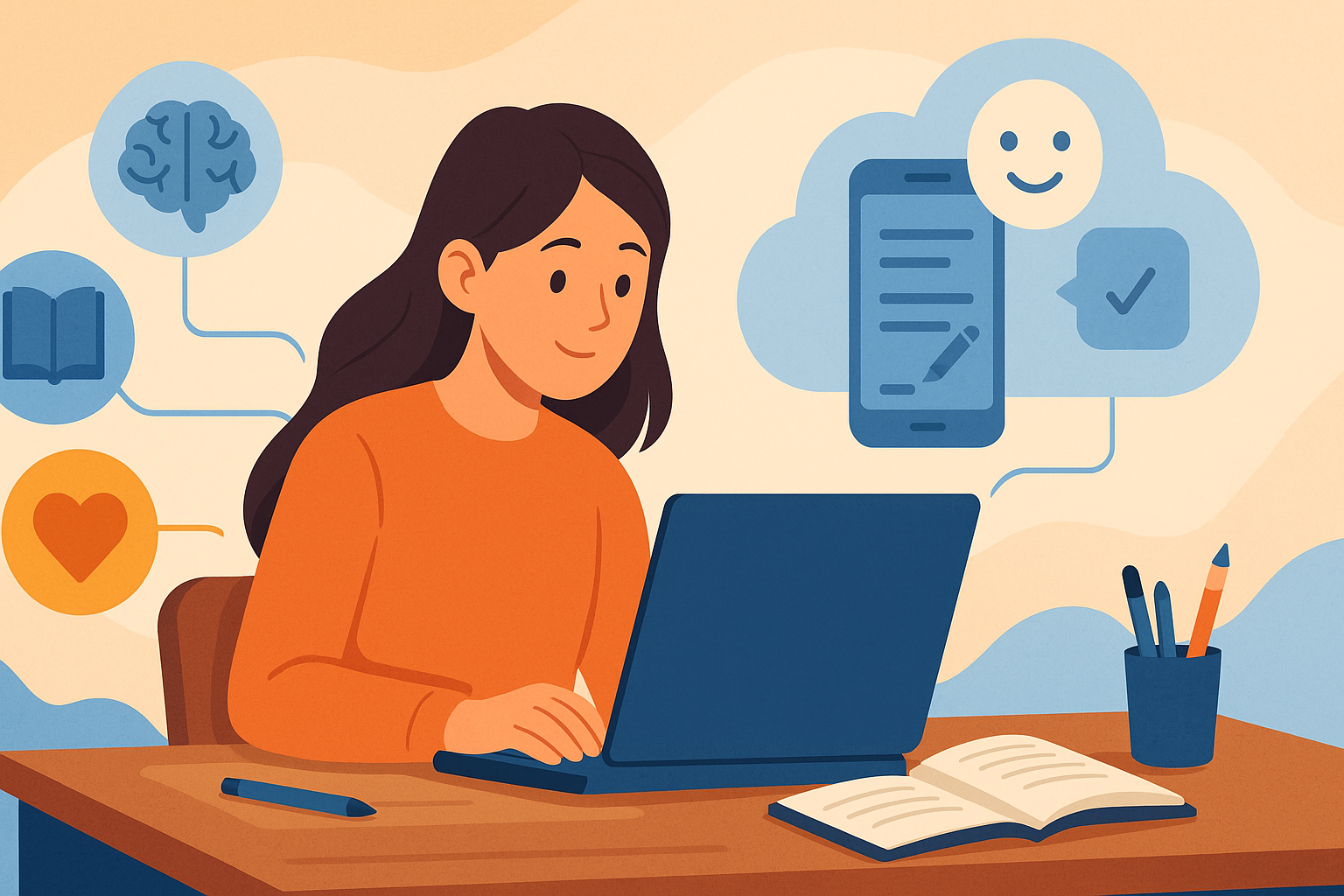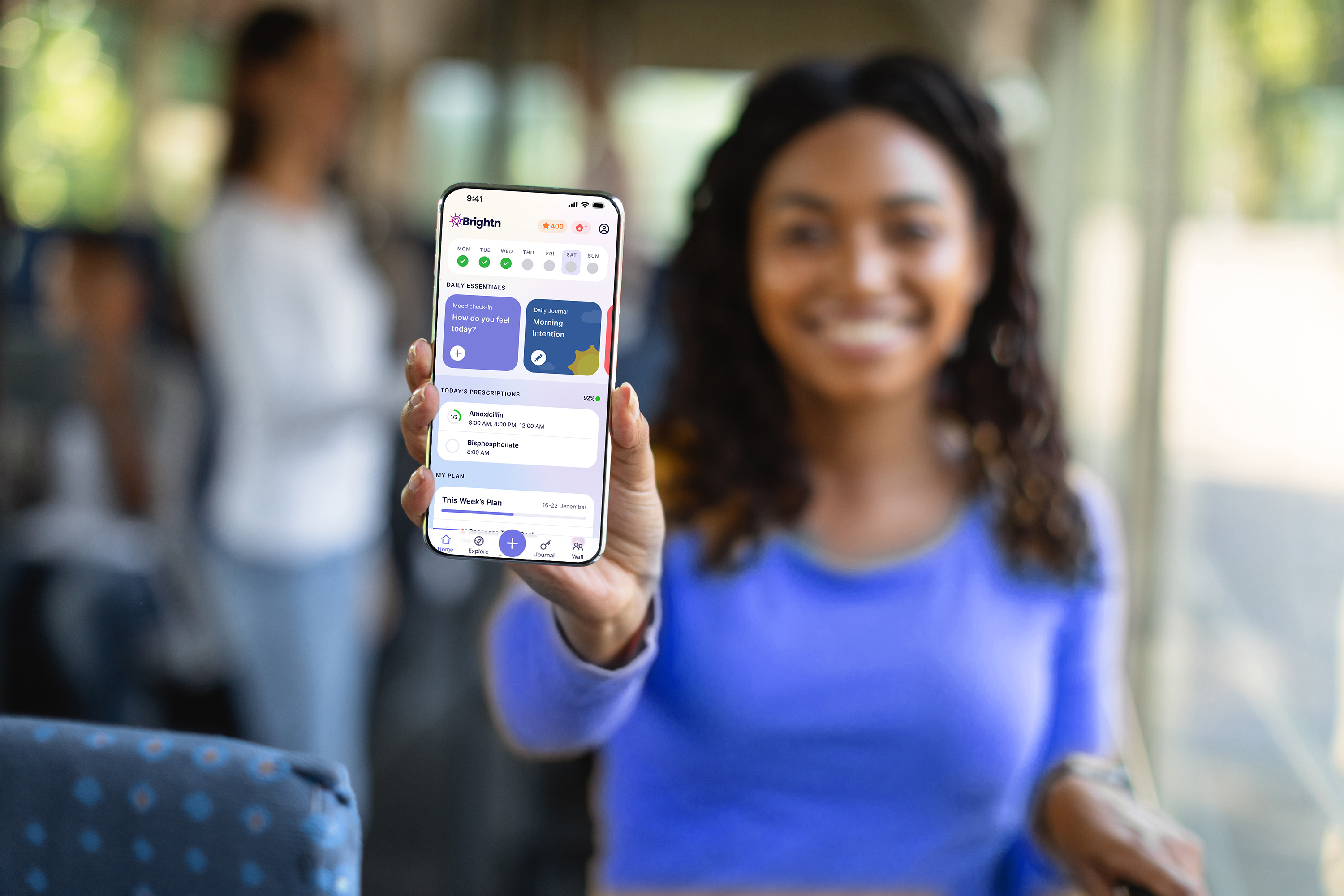
Emilie Mauricio
January 15, 2026
•
9 min read

Mental health challenges among students have reached unprecedented levels. Nearly half of Gen Z feels anxious regularly, and anxiety disorders now affect 30% of teen girls according to the National Association of School Psychologists. While educators desperately search for solutions, one powerful tool is emerging that meets students exactly where they are: AI-powered journaling.
Traditional approaches to student mental wellness often feel outdated, clinical, or disconnected from how today's students actually communicate and process emotions. But what if we could harness the same technology students use daily—their smartphones—to create meaningful, therapeutic experiences that support their emotional growth?
Technology doesn't have to be the enemy of mental wellness. When used thoughtfully, it can become a powerful ally in supporting student emotional health.
Today's educational landscape presents unique mental wellness challenges:
The old model of "just talk to someone" isn't working. Students need tools that feel natural, private, and immediately accessible—tools that speak their language and meet them in their digital-first world.

AI journaling combines the proven benefits of traditional journaling with personalized, intelligent guidance that adapts to each student's unique needs. Instead of staring at a blank page, students engage with an AI companion that asks thoughtful questions, provides gentle prompts, and helps them process complex emotions.
1. Removes the Intimidation Factor Many students feel anxious about sharing their thoughts with adults or peers. AI journaling provides a judgment-free space where they can explore their emotions without fear of criticism or consequences.
2. Available 24/7 Mental health struggles don't follow school schedules. Students can access AI journaling during late-night anxiety spirals, weekend stress, or any moment they need support.
3. Personalized and Adaptive Unlike one-size-fits-all mental health resources, AI journaling learns from each interaction, becoming more attuned to individual communication styles, triggers, and coping mechanisms.
4. Immediate Feedback and Reflection Students receive instant insights about their emotional patterns, helping them develop self-awareness and emotional intelligence in real-time.
5. Privacy and Autonomy Students maintain complete control over their journaling experience, fostering the independence and self-reliance that's crucial for their development.
The Science Behind AI Journaling's Effectiveness
Research consistently shows that journaling improves mental health outcomes. A comprehensive review in Telemedicine and e-Health analyzed 54 studies on digital mental health interventions, finding that personalized, user-friendly platforms with progress tracking significantly increase engagement and positive outcomes.
Studies from the National Center for Biotechnology Information demonstrate that smartphone apps can effectively improve access to mental health resources and build coping skills through stress management techniques like mindfulness and reflection.
Key benefits include:

Start with Education Introduce AI journaling through workshops that teach students about emotional intelligence, the benefits of reflection, and how to use the technology effectively. The Collaborative for Academic, Social, and Emotional Learning (CASEL) provides frameworks for integrating social-emotional learning into educational settings.
Integrate with Existing Programs AI journaling works best when woven into existing mental health initiatives, advisory periods, or even academic subjects like English or health class.
Respect Privacy and Autonomy Students must maintain complete control over their journaling content. The goal is empowerment, not surveillance.
Provide Professional Support While AI journaling is powerful, it's not a replacement for professional mental health care. Schools should maintain clear pathways to counselors and therapists when needed.
Consider a student overwhelmed by college applications and family pressure. Traditional resources might offer generic stress management tips, but AI journaling provides something different. The AI asks: "What would it feel like to make decisions based on your own values rather than others' expectations?"
This personalized prompt helps the student explore their authentic desires, process family dynamics, and develop confidence in their choices. Over time, they build a relationship with their own inner wisdom—a skill that will serve them far beyond graduation.
Modern AI journaling platforms leverage sophisticated natural language processing to:
The most effective platforms combine proven psychological principles with cutting-edge AI to create experiences that feel both deeply personal and professionally informed.
"Will AI replace human connection?" AI journaling enhances rather than replaces human support. It provides students with tools for self-reflection that make their interactions with counselors, teachers, and peers more meaningful. Research from Harvard's Making Caring Common project emphasizes that meaningful connections remain essential for youth development.
"Is it safe and private?" Quality AI journaling platforms prioritize security with end-to-end encryption and user-controlled data retention. Students maintain complete ownership of their content. The FDA provides guidelines for digital mental health tools to ensure safety and efficacy.
"Can students become dependent on technology?" The goal of AI journaling is to build internal emotional intelligence and coping skills. Students learn to understand themselves better, making them more self-reliant, not more dependent.

We're at a pivotal moment in education. Traditional approaches to student mental health haven't kept pace with the challenges young people face. According to the American Academy of Pediatrics, 7 in 10 teenagers consider depression and anxiety major problems among their peers. But by embracing technology that students already use and trust, we can create support systems that are both effective and accessible.
AI journaling represents a bridge between the digital world students inhabit and the emotional skills they need to thrive. It's not about replacing human connection—it's about giving students the tools to connect more authentically with themselves and others.
At Brightn, we understand that students need more than just another app—they need a comprehensive approach to mental wellness that addresses their real challenges. Our AI-powered platform combines personalized journaling with mood tracking, goal setting, and evidence-based strategies for managing stress, building confidence, and discovering purpose.
Brightn's approach is grounded in research showing that effective digital mental health interventions must be:
Our platform uses advanced GPT-4o technology to create truly personalized experiences that evolve with each student's mental health journey. Rather than generic prompts, students receive tailored questions that help them explore their unique challenges and build authentic self-awareness.
Explore More Mental Wellness Resources:
The mental health crisis in education demands innovative solutions. AI journaling offers a powerful tool that meets students where they are while building the emotional intelligence they need for lifelong wellness.
If you're an educator, parent, or student interested in exploring how AI journaling can support mental wellness, download Brightn and experience the difference personalized, intelligent support can make.

Because every student deserves access to tools that help them understand themselves, process their emotions, and build confidence in their ability to navigate life's challenges. In a world of overwhelming pressure and constant change, AI journaling offers something invaluable: a path to inner clarity and emotional resilience.

Is AI journaling appropriate for students of all ages? AI journaling works best for students who can write comfortably, typically middle school age and above. The key is ensuring the platform offers age-appropriate prompts and maintains strict privacy protections.
Can AI journaling identify students who need immediate help? While AI can identify concerning patterns, the goal isn't surveillance but empowerment. Schools should provide clear information about when and how students can access professional support. The American Psychological Association offers resources for crisis intervention in educational settings.
How do we introduce AI journaling without making it feel like another requirement? The most successful implementations present AI journaling as a tool for students' own benefit, not as a school requirement. Students should choose how and when to use it based on their needs.
What about students who prefer traditional journaling? AI journaling complements rather than replaces traditional methods. Some students benefit from the prompts and feedback, while others prefer independent reflection. The goal is providing options that meet diverse needs. Research on journaling benefits shows that any consistent reflection practice can improve mental health outcomes.
Related Articles
The Power of Self-Care: Tips for Taking Care of Your Mental Health: Self-care forms the foundation for emotional stability and academic success. This article provides practical strategies for students to build resilience through better sleep, movement, nutrition, and mindfulness practices.
Financial Wellness: How Money Impacts Mental Health: Financial stress significantly impacts student mental health, from college concerns to family pressures. Learn how developing a healthy relationship with money can reduce anxiety and build confidence for the future.